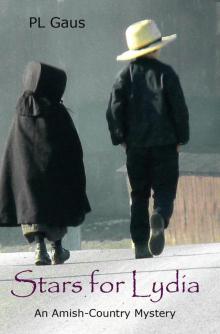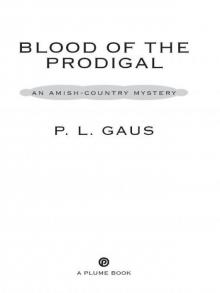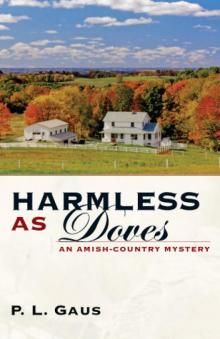- Home
- P. L. Gaus
Harmless as Doves: An Amish-Country Mystery
Harmless as Doves: An Amish-Country Mystery Read online
A PLUME BOOK
HARMLESS AS DOVES
PAUL LOUIS GAUS lives with his wife, Madonna, in Wooster, Ohio, just a few miles north of Holmes County, where the world’s largest and most varied settlement of Amish and Mennonite people is found. His knowledge of the culture of the “Plain People” stems from more than thirty years of extensive exploration of the narrow blacktop roads and lesser gravel lanes of this pastoral community, which includes several dozen sects of Anabaptists living closely among the so-called English or Yankee non-Amish people of the county. Paul lectures widely about the Amish people he has met and about the lifestyles, culture, and religion of this remarkable community of Christian pacifists. He can be found online at: www.plgaus.com. He also maintains a Web presence with Mystery Writers of America: www.mysterywriters.org.
Other Amish-Country Mysteries by P. L. Gaus
Blood of the Prodigal
Broken English
Clouds Without Rain
Cast a Blue Shadow
A Prayer for the Night
Separate from the World
HARMLESS
AS DOVES
P. L. GAUS
PLUME
Published by the Penguin Group
Penguin Group (USA) Inc., 375 Hudson Street, New York, New York 10014, U.S.A. • Penguin Group (Canada), 90 Eglinton Avenue East, Suite 700, Toronto, Ontario, Canada M4P 2Y3 (a division of Pearson Penguin Canada Inc.) • Penguin Books Ltd., 80 Strand, London WC2R 0RL, England • Penguin Ireland, 25 St. Stephen’s Green, Dublin 2, Ireland (a division of Penguin Books Ltd.) • Penguin Group (Australia), 250 Camberwell Road, Camberwell, Victoria 3124, Australia (a division of Pearson Australia Group Pty. Ltd.) • Penguin Books India Pvt. Ltd., 11 Community Centre, Panchsheel Park, New Delhi – 110 017, India • Penguin Group (NZ), 67 Apollo Drive, Rosedale, Auckland 0632, New Zealand (a division of Pearson New Zealand Ltd.) • Penguin Books (South Africa) (Pty.) Ltd., 24 Sturdee Avenue, Rosebank, Johannesburg 2196, South Africa
Penguin Books Ltd., Registered Offices: 80 Strand, London WC2R 0RL, England
Published by Plume, a member of Penguin Group (USA) Inc. Reprinted by arrangement with Ohio University Press.
First Plume Printing, July 2012
10 9 8 7 6 5 4 3 2 1
Copyright © P. L. Gaus, 2011
Excerpt from The Names of Our Tears, copyright © P. L. Gaus, 2013
All rights reserved
REGISTERED TRADEMARK—MARCA REGISTRADA
The Library of Congress has catalogued the Ohio University Press edition as follows:
Gaus, Paul L.
Harmless as doves : an Amish-country mystery / P.L. Gaus.
p. cm
ISBN: 978-1-101-58880-2
1. Branden, Michael (Fictitious character)—Fiction. 2. Amish—Fiction.
3. Amish Country (Ohio)—Fiction. I. Title.
PS3557.A9517H37 2011
813’.54—dc22
2010054588
Printed in the United States of America
Without limiting the rights under copyright reserved above, no part of this publication may be reproduced, stored in or introduced into a retrieval system, or transmitted, in any form, or by any means (electronic, mechanical, photocopying, recording, or otherwise), without the prior written permission of both the copyright owner and the above publisher of this book.
PUBLISHER’S NOTE
This is a work of fiction. Names, characters, places, and incidents are either the product of the author’s imagination or are used fictitiously, and any resemblance to actual persons, living or dead, business establishments, events, or locales is entirely coincidental.
The scanning, uploading, and distribution of this book via the Internet or via any other means without the permission of the publisher is illegal and punishable by law. Please purchase only authorized electronic editions, and do not participate in or encourage electronic piracy of copyrighted materials. Your support of the author’s rights is appreciated.
BOOKS ARE AVAILABLE AT QUANTITY DISCOUNTS WHEN USED TO PROMOTE PRODUCTS OR SERVICES. FOR INFORMATION PLEASE WRITE TO PREMIUM MARKETING DIVISION, PENGUIN GROUP (USA) INC., 375 HUDSON STREET, NEW YORK, NEW YORK 10014.
ALWAYS LEARNING
PEARSON
Dedicated to my mother, Ollie Marie
(Mrs. Robert Louis) Gaus, who has asked me several
times to tell what became of Sara Yoder after her
rescue in A Prayer for the Night.
PREFACE AND
ACKNOWLEDGMENTS
SALT CREEK Township Lane 601, in north-central Holmes County, Ohio, skirts a crest overlooking a wide pastoral valley in the hills south of Fredericksburg, and on a three-mile stretch of that simple country lane, one finds a curious assortment of Amish farms and English homes. The mix of cultures is fascinating, and the range and variety of religious persuasions among the Plain People is likely to be surprising to those who have not frequently traveled the region. Like much of the rest of Holmes County, this is a place set thoroughly apart, and typical of most complex religious tapestries, there is great variety among the various Schwartzentruber and Old Order Amish peoples who live there.
The Amish enterprises on this short stretch of road are also greatly varied. There is a sawmill, a carpenter’s shop, a stove factory, a harness shop, a sewing shop, an old gasoline engine repair shop, and two one-room parochial schools, one nearly eighty years old and the other quite new and modern, in a peculiarly Amish modern way. Cars, trucks, and horse-drawn buggies, surreys, hacks, and wagons share the road on any given day, and occasionally in summer, one sees kids out with pony carts, too, pacing along serenely, where little of the spectacle of modern America ever intrudes. In fact, it is so quiet and remote there that the high ground to the south is still a good place to see the night stars, because there are so few electric lights to dim the display of the heavens. So, this sheltered corner of Holmes County seemed to me to be the perfect place to set this story, with characters who rarely get to town, who rarely have any contact with the ignoble circus of modern American culture, and who typically have scant knowledge of modern law enforcement protocols involving arrest and Miranda warnings.
For the portion of the story that takes place in greater Sarasota and Manatee Counties, Florida, I am indebted for hospitality to David and Ann Chatlain, as well as for nautical expertise to Seaman Richard M. Royal, BM3, U.S. Coast Guard, Cortez Station. I also thank Laura McKee for spiritual insight.
But my greatest thanks go to David Sanders, who mercifully convinced me to abandon the first draft of this story and start completely anew. Over the years, his insights into my stories and characters have been a steadfast and accomplished source of instruction and inspiration.
Behold, I send you forth as
sheep in the midst of wolves:
be ye therefore wise as serpents
and harmless as doves.
Matthew 10:16
HARMLESS AS DOVES
Table of Contents
1
2
3
4
5
6
7
8
9
10
11
12
13
14
15
16
17
18
19
20
21
22
23
24
25
26
27
28
29
30
31
32
33
34
35
36
37
The Names of Our Tears
1
Wednesday, October 7
4:30 A.M.
WELL BEFORE dawn, Bishop Leon D. Shetler was coaxed from sleep by the whispers of his morning chores, and he rose up and sat on the edge of his bed, honoring his custom of thanking God for the peace that rested over his household. He knew that the worries of leadership would soon find him, but for the moment, as he sat in the dark, the blessings of his life were the focus of his thoughts. It was like that every morning for him. There was peace before daylight, and as was his habit, he sat still for a long moment to enjoy it.
Beside him, Katie stirred in her sleep and then settled deeper into her pillow. She was as familiar to him as his own thoughts, as comfortable in his life as his most intimate prayers, and he thanked God for her, wondering how many men still knew to thank God for their wives. He tried to teach the men about this at the Sunday meetings, but he often asked himself how many of them really understood.
As he sat and prayed, he felt a cool draft over his toes, the night air spilling in over the sill, and he wondered how many men knew to let their houses breathe this way, with the health of fresh air drifting in through the screens.
In his stocking feet, he eased down the cherry-wood staircase to the kitchen, drawing his sleeping shirt around him. Sure of his way in the dark, he stepped to the wooden counter, took a match from a canister, and stroked it against the metal dome of his red kerosene milking lantern. Once he had the flame guttering with new life, he adjusted the wick and set the lantern on the counter. Then as the lantern threw soft light into the kitchen, he rubbed the sleeve of his blouse and asked himself silently how many men still knew the blessings of silk, sleeping in the garments their wives had made—a soft blouse, sleeping pants of cotton, and socks of warm wool?
He had tried to teach his men about this, too. But how many men understood these blessings? How many men still knew to thank God for their wives in this peaceful time of the day, before the worries of life pressed forward in the mind?
Striking another match, Bishop Shetler lit a fire in the front chamber of his cast-iron woodstove, and the aromatic smoke from the walnut kindling lifted a pleasant aroma into the cold kitchen air. At the aluminum sink, he pumped the black spigot handle several times and rinsed soot from his knuckles, using the sulfur water from the well beneath the house. Back at the counter, he sliced an orange on the wood block and stood at the kitchen window to bite into a wedge, thinking it a marvel that this orange had been hanging on a tree in Pinecraft, Florida, only a week ago. But why should he marvel? The congregation had arranged for the bus driver to bring him a box of oranges every week, and he was only too happy to accept the gesture. After all, the gift of fresh fruit was scant compensation for the duties he shouldered as bishop.
Maybe this year he and Katie would go to Pinecraft and pick their own oranges. Blue skies, palm trees, and the white sand beaches nearby. Just a week in Pinecraft, like everyone else. Twenty-four hours on a Pioneer Trails bus to Sarasota, and they’d be slicing the oranges they’d picked themselves. They’d ride the city bus out to the beach. Everybody said Lido Beach was the best. Less crowded than Siesta. Just an easy bus ride over the causeway bridge, and he and Katie would be wading in the surf, while snow blanketed the ground in Ohio. And they’d ride those large tricycles there, all around among the cottages and trailers, visiting with folk from the Amish settlements up north, lounging on chairs in the sun, and meeting the bus each day to see who else had just made the trip down. Yes, Pinecraft is the Amish place for winters, the bishop reckoned. They could bunk in with relatives—everybody knows someone down there—and take their time with each sunny day, letting the ocean breezes stir through their hair.
But what nonsense, Leon thought. What vanity. Of course you’ll never go. The people—the Gemie—the church needs you here. Your duties are clear. And why complain? You have fresh oranges—all you can eat—so let it be, old Leon, let it be.
Finished with his orange and shaking his head at his dreams of Pinecraft, the bishop poured hot water into a coffee mug. He spooned instant coffee into the water, stirred it twice around with a callused finger, and carried it out to the mudroom in back. There, he took his first sip and set the coffee mug on a shelf. Then he stuffed his stockinged feet and sleeping pants into the legs of his denim dungarees—his wife had made those, too—and he swung his shoulders through his suspenders, pulled on a denim waistcoat, and set his black felt hat on his head.
When he had wiggled his feet into his muck boots, he pushed through the back door into the night air, chuckled over his forgetfulness, and turned back inside to retrieve the lantern and his coffee mug. But he noticed that he’d left the door on the woodstove hanging open in front, so he set the lantern down on the porch floor and walked back into the kitchen, where he closed the door of the stove to temper the flames.
No point wasting wood, he thought. Let it burn slowly until Katie wakes up. As cold as it was these days, she’d appreciate the fire in the stove. The kitchen would be warmed up in no time at all, if puttering old fools didn’t leave the stove door hanging open in front of the flames.
Outside behind the big house, Shetler headed for the barn with his coffee and lantern in hand, and as he drew near to the barn, he heard Hedda, already in her stall, stomping to be milked. Impatient in her old age, he thought. She was his last milking cow.
Once his dairy herd had numbered in the dozens. His spread was as big as anyone’s. But he had drawn the lot, and God’s calling had settled upon him. He had decided to disperse his herd in order to attend to his new duties as bishop. But old Hedda he had kept. Hedda for her sweet milk. And to preserve his illusions, he chuckled, that he was still only a simple, peasant farmer, and not the leader of all his people.
Nosed into her milking stall, Hedda stamped her feet again as he walked up to her with his lantern. He took his three-legged milking stool down from a peg and dropped it onto the straw-covered floor, beside her back feet. After he had positioned his milking pail under her udder, he warmed his hands on the coffee mug, and as he stroked the milk from her, Bishop Shetler remembered the other cows he had tended in his years on the farms. First as a lad on his father’s sprawling farm, then on this smaller section, once his father’s original spread had been divided among the sons. Now Shetler’s nearest neighbors were his own brothers and their families. The other people of his district had the outlying farms, with a few English souls sprinkled into the mix, all of it straddling Salt Creek Township Lane 601, in the hill country south of Fredericksburg, Ohio. Salt Creek South, his district was called. Thirty-five families with the one-room schoolhouse for their young scholars. A cemetery, a sawmill, two furniture shops, an engine repair shop, a sewing machine concern, a buggy shop, and a wheel factory, plus a harness shop and two blacksmiths.
As he milked, the bishop’s mind turned toward his duties, and as the peacefulness of his morning thoughts faded, he remembered again that there were English in the valley, too. Just a few, but some of them were rare characters. Like Billy and Darba Winters—Billy a conspiracy theory nut, and Darba half troubled in her own way. She kept that Rumspringe room in her barn, for the Amish kids running wild, and Shetler knew he’d have to challenge that, someday. Trouble was, the kids were going to run wild sometime, and maybe a safe place to do that was what they needed most. Maybe he should just look the other way. If he never brought it up, he’d never have to rule against it. So, maybe the better wisdom was just to let it be. At least for now.
And remember, the bishop thought, that Katie liked Darba Winters, and she cared for her in her “blue” times. She sat with Darba in her periods of “negativity.” Leon didn’t understand Darba’s troubles entirely, but he respected Katie’s instincts to care for her, and when Darba had needed someone other than her psychiatrist to talk to, Katie had proved as good a listener as anyone. Katie was good for Darba, and Bishop Shetler knew to let that be, too. Darba had
been a fine teacher, and she deserved a good friend to talk to.
Then there was Glenn Spiegle, a new convert to Amish ways but, truth be told, little more than a wayward drunk from Florida, who hadn’t yet confessed all of his sorrows. A man who couldn’t yet speak of his deepest remorse. But Shetler had accepted him, and so had the congregation. Spiegle had taken a pledge to stop drinking, moved to Holmes County, studied with Shetler, and been baptized—converted to Amish life by the guilt he carried forward from his past, and by the testimony of peacefulness that he had witnessed in the brethren in Pinecraft, in the eastern suburbs of Sarasota.
But remember, the bishop thought, that it was Billy Winters who had brought him up here. Yes, acknowledge that, Old Leon. Conspiracy nut though he was, Billy Winters had still managed to dry Glenn Spiegle out after prison, and he had brought him up to Ohio two years ago in his truck. Now Spiegle lives righteously among us—because of the friendship of Billy Winters—and the bishop wondered how many men would make that much of a difference in another man’s life.
But there was also trouble in that redemption story. Spiegle had money. Cash money, and a lot of it. He’d agreed to pay an English price for an Amish farm, and it had been my decision, Leon mused, whose land he would buy—Mony Detweiler’s and not Jacob Miller’s.
But now Leon realized he should have foreseen the trouble. He should have known that the allure of riches would snare the greedy man first. He should have known that Jacob Miller, always quick to perceive a slight and far too interested in his personal prosperity, would never get over the loss of all that money. It wouldn’t matter in the least to Jacob Miller that Mony Detweiler’s duty was to hold that money for the district, as an emergency fund. For hospital bills. For the property taxes. For new land purchases for the young lads who would need farms in order to start their own families. It was money that was already spoken for, and Detweiler could never spend it on his own. He was obliged by the bishop’s instructions to hold the money in reserve, to be used only for the good of the people.

 Stars for Lydia
Stars for Lydia Cast a Blue Shadow
Cast a Blue Shadow Separate from the World
Separate from the World Clouds without Rain
Clouds without Rain Blood of the Prodigal
Blood of the Prodigal Whiskers of the Lion
Whiskers of the Lion A Prayer for the Night
A Prayer for the Night Broken English
Broken English Harmless as Doves: An Amish-Country Mystery
Harmless as Doves: An Amish-Country Mystery